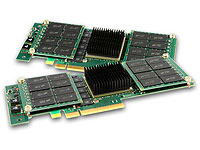What a week for storage, specifically for flash vendors.
It started early in the week with news that EMC’s officially unveiled VFCache (formerly “Project Lightning”), a PCIe add-on card for servers. That’s right, EMC’s is entering the flash cache field pioneered by Fusion-io.
But rather than targeting web and cloud services providers, EMC wants those staid workloads at corporate data centers. Over at InfoStor, I reported:
True to its penchant for business computing, EMC is targeting “mainstream mission-critical applications such as Microsoft, Oracle and SAP,” luring IT execs with the promise of faster, more responsive database, e-mail and online transaction servers.
IBM got in on the act with an SSD storage option for its XIV storage arrays. And finally, Hitachi GST announced the availability of the fastest enterprise SSD — with a little help from Intel. Based on new 25nm, SLC chips, it can deliver read and write speeds of 536 MBps and 502 MBps, respectively.
The name of the game is speed. And one company set out to break records.
Virident plows through Oracle in a flash
Milipitas, Calif.-based Virident Systems, a startup that makes flash PCIe server cards, teamed up with NEC for an experiment. They outfitted an NEC Express5800 server with eight of Virident’s FlashMAX cards, each packing 1.4TB of MLC flash storage for a total of 11TB.
The results were every database admin’s dream: a record-setting Oracle database performance rating of 1.2 Million IOPS.
Why Oracle? In a phone conversation with Shridar Subramanian, Virident’s vice president of product marketing, he says it’s all about “delivering performance that’s relevant to CIOs.” And besides Oracle’s ubiquity in corporate IT, it’s a market that’s rife with opportunity.
Citing analysts’ forecasts, there’s a big market brewing for data warehousing, data analytics and OLTP workloads, all of which can use a little flash boost on Oracle. How big of an opportunity? $4.7 billion, according to Subramanian.
Little wonder the industry’s got flash fever.


Leave a Reply